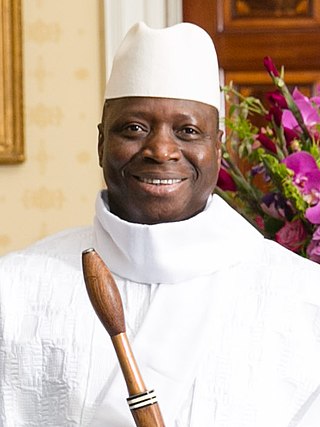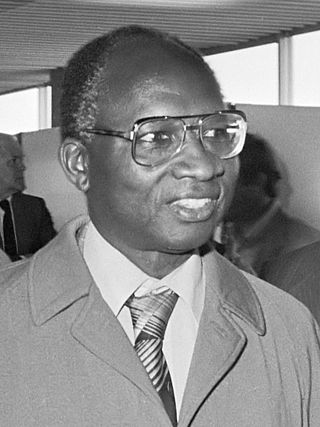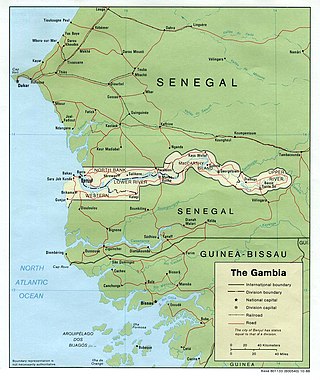 |
|---|
General elections were held in the Gambia on 28 and 29 March 1972. They were won by the ruling party, the People's Progressive Party, which took 28 of the 32 elected seats (including five in which its candidates were unopposed). [1]
 |
|---|
General elections were held in the Gambia on 28 and 29 March 1972. They were won by the ruling party, the People's Progressive Party, which took 28 of the 32 elected seats (including five in which its candidates were unopposed). [1]
| Party | Votes | % | Seats | +/– | |
|---|---|---|---|---|---|
| People's Progressive Party | 65,388 | 62.96 | 28 | +4 | |
| United Party | 17,161 | 16.52 | 3 | –1 | |
| Independents | 21,302 | 20.51 | 1 | +1 | |
| Paramount chiefs' representatives | 4 | – | |||
| Presidential appointees | 3 | – | |||
| Attorney General (ex officio) | 1 | – | |||
| Total | 103,851 | 100.00 | 40 | 0 | |
| Registered voters/turnout | 136,521 | – | |||
| Source: African Elections Database | |||||

The Gambia, officially the Republic of The Gambia, is a country in West Africa. Geographically, The Gambia is the smallest country in continental Africa; it is surrounded by Senegal on all sides except for the western part, which is bordered by the Atlantic Ocean.

Politics of The Gambia takes place within the framework of a presidential republic, whereby the President of The Gambia is both head of state and head of government, and of a multi-party system. Executive power is exercised by the government. Legislative power is vested in both the government and parliaments.

The first written records of the region come from Arab traders in the 9th and 10th centuries. In medieval times, the region was dominated by the Trans-Saharan trade and was ruled by the Mali Empire. In the 16th century, the region came to be ruled by the Songhai Empire. The first Europeans to visit the Gambia River were the Portuguese in the 15th century, in 1447, who attempted to settle on the river banks, but no settlement of significant size was established. Descendants of the Portuguese settlers remained until the 18th century. In the late 16th century, English merchants attempted to begin a trade with the Gambia, reporting that it was "a river of secret trade and riches concealed by the Portuguese."

Yahya Abdul-Aziz Jemus Junkung Jammeh is a Gambian politician and military dictator who overthrew the elected government and became President of the Gambia from 1996 to 2017, as well as Chairman of the Armed Forces Provisional Ruling Council (AFPRC) from 1994 to 1996.

The flag of The Gambia is the national flag of The Gambia. It consists of three horizontal red, blue and green bands separated by two thin white lines. Adopted in 1965 to replace the British Blue Ensign defaced with the arms of the Gambia Colony and Protectorate, it has been the flag of the Republic of the Gambia since the country gained independence that year. It remained unchanged throughout the Gambia's seven-year confederation with Senegal.

Sir Dawda Kairaba Jawara was a Gambian politician who served as prime minister from 1962 to 1970, and then as the first President of The Gambia from 1970 to 1994, when he was deposed.

The People's Progressive Party is a political party in the Gambia. It was the dominant ruling party of the House of Representatives and the presidency from 1962 to 1994. The president throughout this time period was Dawda Jawara.

Central River is the largest of the five administrative divisions of the Gambia. Its capital is Janjanbureh, on MacCarthy Island. The largest settlement is Bansang, with an estimated population in 2008 of 8,381.

The National Assembly of the Gambia is the unicameral legislature of the Gambia. The authorisation for the National Assembly lies in Chapter VII of the Constitution of the Gambia. It is composed of 53 members directly elected through first past the post, and a further five members appointed by the President.
The tourism industry today in the Gambia started when a party of 300 Swedish tourists arrived in 1965. That pioneering trip was organised by a Swede named Bertil Harding together with the tour operators Vingresor. It was seen as an ideal place to escape the harsh winter months of Scandinavia where Europeans would enjoy not only sun, sand and beaches but also experience the excitement of a real African holiday. It also offered a new opening for an affordable holiday to increasing numbers of traveling Europeans.
The Gambian hip hop scene is a relatively new scene in African hip hop which developed in the mid-1990s and was heavily influenced by American hip hop and Senegalese hip hop. Gambian hip-hop has been heavily influenced by international music scene including worldbeat, Senegalese wolof music, and American hip hop, as well as traditional Gambian mbalax and n'daga music. Dominican merengue and Jamaican reggae, ragga, and dancehall have also influenced the development of Gambian hip-hop.
Madi Ceesay is a Gambian journalist. He served as president of the Gambia Press Union, and was imprisoned and harassed for his journalistic work. According to the US-based Committee to Protect Journalists (CPJ), Ceesay's work has provided critical support for freedom of the press in Gambia, where journalists were frequently imprisoned and attacked.

Alieu Ebrima Cham Joof commonly known as Cham Joof or Alhaji Cham Joof, was a Gambian historian, politician, author, trade unionist, broadcaster, radio programme director, scout master, Pan-Africanist, lecturer, columnist, activist and an African nationalist who advocated for the Gambia's independence during the colonial era.

In the 1994 Gambian coup d'état, a group of soldiers led by 29-year-old Lieutenant Yahya Jammeh seized power in a bloodless coup d'état on the morning of 22 July, ousting Dawda Jawara, who had been President of The Gambia since it became a Republic in 1970.

The Gambia Colony and Protectorate was the British colonial administration of The Gambia from 1821 to 1965, part of the British Empire in the New Imperialism era. The colony was the immediate area surrounding Bathurst, and the protectorate was the inland territory situated around the Gambia River, which was declared in 1894.

Presidential elections were held in The Gambia on 1 December 2016. In a surprise result, opposition candidate Adama Barrow defeated long-term incumbent Yahya Jammeh. The election marked the first change of presidency in The Gambia since a military coup in 1994, and the first transfer of power by popular election since independence from the United Kingdom in 1965.

Adama Barrow is a Gambian politician and real estate developer who has served as President of the Gambia since 2017.

Presidential elections were held in the Gambia on 4 December 2021. The result was a victory for incumbent President Adama Barrow of the National People's Party, who received 53% of the vote, defeating five other candidates.

The 2022 Gambian coup attempt was a military coup d'état attempt which took place in The Gambia on 20 December 2022. Reportedly, some soldiers attempted to overthrow the government of President Adama Barrow. Four soldiers were arrested on suspicion of involvement. The Gambian military initially denied that any such coup attempt took place. It also went after three other alleged conspirators. The coup leader was later named as LCpl Sanna Fadera. The attempt was condemned by Economic Community of West African States (ECOWAS) and the main opposition party, the UDP.